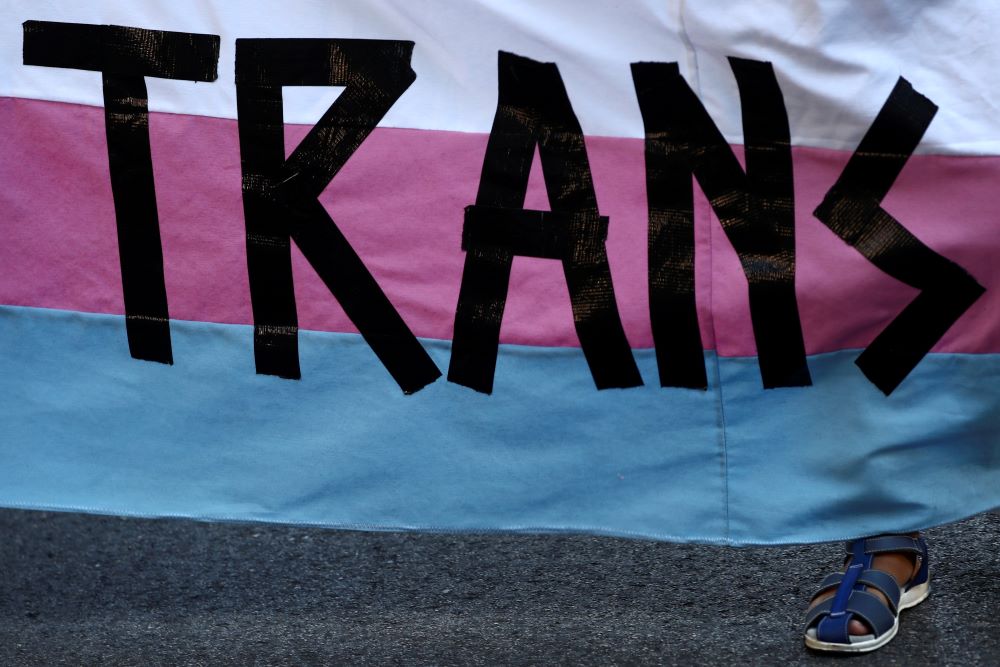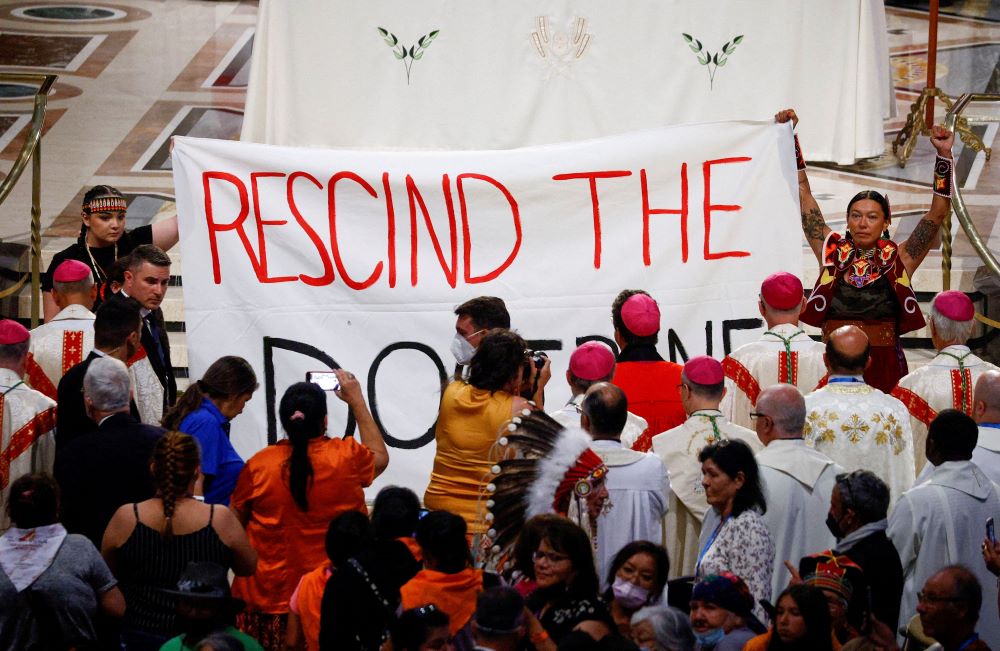
A person holds a "Trans" banner in this illustration photo. (OSV News photo/Reuters/Sergio Perez)
Editor's note: Global Sisters Report's Monday Starter is a feature from GSR staff writers that rounds up news from or about women religious that you may otherwise have missed.

Twenty-eight communities of sisters and sister organizations joined together to stand in solidarity with transgender, nonbinary and gender-expansive individuals in honor of Trans Day of Visibility on March 31.
The statement and call to action was prepared by representatives from the U.S. Federation of the Sisters of St. Joseph, the Sisters of Providence of St.-Mary-of-the-Woods and the Sisters of Charity of Leavenworth, Kansas. The signers represent more than 6,000 sisters in 18 states.
"As vowed Catholic religious and our partners in mission, we wholeheartedly affirm that transgender, nonbinary, and gender-expansive individuals are beloved and cherished by God," the statement says.
While the statement is in honor of Trans Day of Visibility, it notes that the stance must not be limited to one day.
"We know our actions and commitments must extend beyond this day's observance. As members of the body of Christ, we cannot be whole without the full inclusion of transgender, nonbinary, and gender-expansive individuals," it says.
The statement points out that these individuals are the subject of anti-LGBTQ legislation in several states; the target of harmful rhetoric from Christian groups, including the Catholic Church; and recipients of daily discrimination and violence.
"The Gospel call of unifying love compels us to actively interrupt harmful interactions in daily life and dismantle the systems that reinforce this rhetoric and violence in society, particularly for Black, Indigenous, and other folks of color. We will remain oppressors until we — as vowed Catholic religious — acknowledge the existence of LGBTQ+ people in our own congregations. We seek to cultivate a faith community where all, especially our transgender, nonbinary, and gender-expansive siblings, experience a deep belonging," it says. "May we act to transform our hearts, our church, our politics, and our country to ensure that the dignity of our trans, nonbinary, and gender-expansive siblings are acknowledged, boldly accepted, and celebrated."
The statement is also a call to action, encouraging people to follow proposed legislation targeting LGBTQ rights; support organizations that support transgender individuals, such as The Trevor Project or New Ways Ministry; examine how your own organizations welcome trans individuals; and consider signing the Beloved by God declaration.
Signatories to the statement include Adorers of the Blood of Christ; School Sisters of Notre Dame; Congregation of St. Joseph; Dominican Sisters of Houston; IHM Sisters of Monroe, Michigan; Sisters of St. Francis of Clinton, Iowa; Presentation Sisters of Dubuque, Iowa; Loretto Community; Sisters of Charity of St. Elizabeth; Sisters of Charity of Nazareth; Sisters of Charity of the Blessed Virgin Mary; Sisters of St. Joseph of Carondelet; Sisters of St. Francis of Assisi; Sisters of St. Joseph of Springfield, Massachusetts; Sisters of St. Joseph of Brentwood, New York; and the Sisters of St. Agnes.

Indigenous people hold a banner calling on Pope Francis to "rescind the doctrine," a reference to the so-called Doctrine of Discovery, during a papal Mass on July 28, 2022, at the National Shrine of Sainte-Anne-de-Beaupré in Quebec. (CNS/Reuters/Guglielmo Mangiapane)
Adrian Dominicans support repudiation of Doctrine of Discovery
After nearly 600 years, the Catholic Church has finally repudiated the Doctrine of Discovery, which was used to justify colonial exploitation.
In a statement issued March 30, the Vatican said the doctrine, based on papal writings from the 1400s, is "not part of the teaching of the Catholic Church" and those documents "have never been considered expressions of the Catholic faith." But it also acknowledges that the papers, called papal bulls, did not reflect the dignity of Indigenous people and were used to justify immoral acts. Church authorities did not oppose those acts, the statement notes.
Under the Doctrine of Discovery, Catholics claimed a church mandate to conquer lands, subjugate Indigenous people and practice slavery; some U.S. congregations of women religious owned slaves until the Civil War.
The same day the Vatican released its announcement, the Adrian Dominican Sisters issued a statement affirming the stance and thanking the pope.
"We are deeply grateful to Pope Francis for his humble, open-hearted listening to our indigenous sisters and brothers; for honestly naming the Church's errors; and for clearly calling us forward as human persons, all made in God's image, never again 'to be infected by the idea that one culture is superior to others,' " the statement says.
The Vatican noted that church documents as far back as 1537 state that Indigenous people and their rights are to be respected and that slavery is wrong, but that did not stop people from claiming that church teaching backed colonialism.
There comes a time when pointing out those teachings is not enough and the doctrine must be publicly disavowed, the Vatican added.
"In no uncertain terms, the Church's magisterium upholds the respect due to every human being," the document says. "The Catholic Church therefore repudiates those concepts that fail to recognize the inherent human rights of indigenous peoples, including what has become known as the legal and political 'doctrine of discovery.' "
That repudiation, the Adrian Dominicans wrote, "is a step that indigenous people around the globe have long pressed for and that we too joined in support."
Advertisement
Webinar will share strategies to end human trafficking
The Africa Faith and Justice Network, the Dominicans for Justice and Peace, and Talitha Kum in Africa will host a webinar sharing successful strategies for tackling human trafficking.
The virtual event is 11 a.m. Eastern time April 5 and will feature four Catholic sisters utilizing their advocacy skills to end human trafficking in their communities:
- Sr. Mary Lilly Driciru, a member of the Missionary Sisters of Mary Mother of the Church from Uganda;
- Sr. Mary Rose Barnabas Kisanga, a member of the Little Sisters of St. Francis from Tanzania;
- Sr. Juliet Ifediba, a member of the Congregation of Our Lady of Apostles from Nigeria; and
- Sr. Kayula Lesa, a member of the Religious Sisters of Charity from Zambia.
The four were trained at the Africa Faith and Justice Network's Women Empowerment Project advocacy workshops.
The webinar will show how the sisters' efforts have led to the rescue of trafficked girls, the arrest of traffickers and closure of brothels, new policies and legislation, and the awakening of communities to the realities of trafficking and the tactics used.
The event is free but requires registration.







